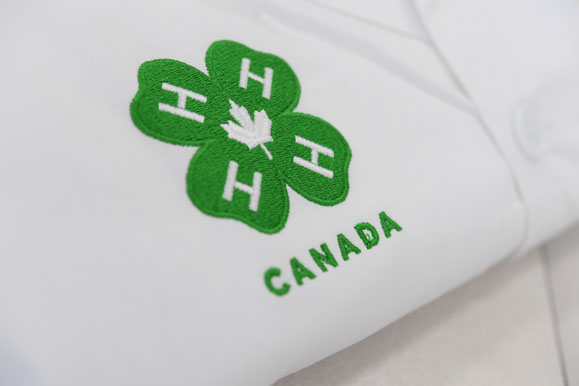News
» Go to news mainFaculty of Agriculture proud to host students for 4‑H Canada Science Fair
After months of hard work and preparation, students from across Canada presented their science fair projects to judges and the public over the weekend at the 4-H Canada Science Fair.
Eighteen Canadian 4-h youth from grades 7-12 gathered in Truro this past Friday and Saturday as Dalhouise University Faculty of Agriculture hosted the second annual 4-H Canada Science Fair. The science fair, coordinated by 4-H Canada, encourages young, curious minds to ask questions about the world around them and to identify solutions. The 4-H Canada Science Fair also encourages students to consider a career in the science, technology, engineering and mathematics fields.

"4-H Canada is proud to host our second annual 4-H Canada Science Fair at the Dalhousie University Agricultural Campus,” says Shannon Benner, CEO, 4-H Canada. “4-H is known to be a connection hub with agriculture at all levels and by fostering an appetite for science, technology, engineering and mathematics in our youth members, we build their confidence to explore scientific ideas and opportunities.”
Out of the 18 4-H'ers participating in the 4-h Canada Science Fair three were repsenting Nova Scotia - Chase DeViller of Lower Wedgeport, Signe Caswell of Waverley and Chelsey Munroe of Middle Sackville. Inspiration for Chase, Signe and Chelsey's projects stemmed from their interests, observations from their 4-H club projects and challenges they wished to solve.
Chelsey’s project, titled What's on Your Beach?, took a close look at 15 different beaches in Nova Scotia to identify common litter and debris and how to prevent it from ending up on the beach. Chelsey explains she got the idea for her project when visiting beaches on family outings and searching for sea glass.
“I would visit the beach with my family and make jewelry out of the ‘sea glass,’ but then one day I realized that this ‘sea glass,’ was actually pollution,” Chelsey explains. “It was a sad revelation and so I decided to focus my 4-H Canada Science Fair project on studying 15 different beaches in Nova Scotia to identify common litter and debris, and how to prevent it from ending up on the beach. Next year, I’m thinking of studying the negative health and environmental effects of smoking.”
Chase’s project, Electronic Devices on Plants, observes the effect of electronic radiation on early plant growth. This is Chase’s second year as a national finalist at the science fair. Chase explains that the idea for his project came from his interest in plants and the popularity of electronic devices.
“This is my second year as a finalist at the 4-H Canada Science Fair,” Chase says. “This year, I noticed that many of my friends and classmates all had cellular devices and combining this with my interest in plants, I decided to observe the effect of electronic radiation on early plant growth for my 4-H Canada Science Fair project. I hypothesized that seeds exposed directly to cell phones would grow the least and in the end, my hypothesis was not proven correct. From this experiment, I recommend to others to consider charging their phones away from their beds and bedrooms.”
Signe studied Nova Scotia water shortage levels to determine preventative measures that can be taken before a water crisis hits. Her project was titled, Water Shortage or Full of Opportunity?.
Although competing against each other for the top prize, an opportunity to advance to the Canada-Wide Science Fair, the 4-H Canada Science Fair is much more than a competition. It is a chance for students to get to know peers with similar interests across the provinces and to make friends, all while exploring science and technology activities on the Agricultural Campus. The young scientists were invited by the Faculty of Agriculture to extract DNA from strawberries, observe3-D printing and to participate in other interactice activities focused areas within agriculture, science and technology.
“As the world increasingly looks to youth to shape conversations and drive innovation in key areas of science, technology and sustainable agriculture, 4-H is empowering its members to adopt science and technology into their everyday thinking,” Shannon Benner explains. “Through the 4-H Canada Science Fair, Canadian youth are enhancing the world around them including their clubs, their communities and their country.”
Students also had the opportunity to check out the new Discovery Centre in Halifax during their visit to Nova Scotia. Their projects were available for public viewing at the Discovery Centre throughout the day on Saturday.
As the 4-H Canada Science Fair wraps up, students, faculty and staff at Dal AC feel a sense of pride that the campus was selected to host the 4-H Canada Science Fair. Together with 4-H the Faculty of Agriculture played an active role in fostering the next generation in science and technology enthusiasts.
“We couldn’t be more proud to host the second annual 4-H Canada Science Fair on our beautiful agricultural campus and to welcome these bright, young science minds from across the country,” said Dean David Gray. “The calibre and scope of these projects is a wonderful reminder of the innovative and creative thinking that will be brought to bear on the Agriculture industry in the future. Congratulations!”
Recent News
- Theatre props available
- Transforming Poultry Care with Artificial Intelligence
- New Face on Campus
- Chloe Toombs ‑ Combining agriculture and engineering
- Dalhousie's HCFAI Webinar ~ Pioneering the Future of Digital Animal Farming
- Community Credit Union supports Sustain Garden
- Reduced Facilities Management Service
- Indigenous Seven Feathers Crosswalk on Agricultural Campus
